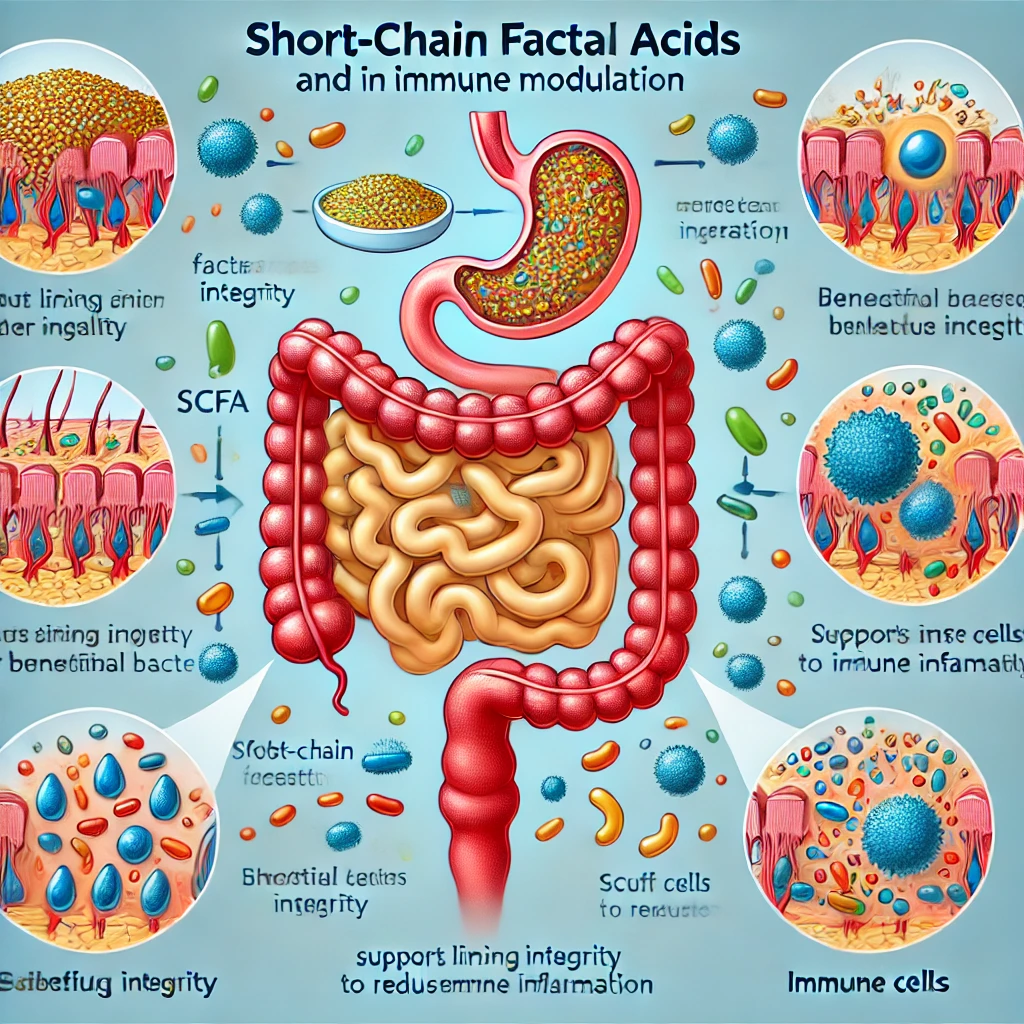
Gut health is more than just a buzzword—it’s a crucial aspect of overall well-being. It all starts with the gut microbiota, a complex community of microorganisms in our digestive tracts. These trillions of bacteria, viruses, and fungi are pivotal in everything from digestion to immune system regulation.
The Importance of a Healthy Gut Microbiome
A healthy gut microbiome functions like a well-oiled machine, aiding in:
- Breaking down food
- Absorbing nutrients
- Protecting against harmful pathogens
However, various health issues can arise when this delicate balance is disturbed, including food sensitivities and intolerances. Symptoms of an imbalance, or dysbiosis, include:
- Bloating
- Gas
- Stomach pain
- Constipation
- Diarrhea
Steps to Maintain a Balanced Gut Microbiome
To keep your gut balanced, taking care of the friendly microbes that live there is essential. Here’s how:
- Eat a diet rich in fiber, fermented foods, and probiotics.
- Fiber feeds beneficial bacteria.
- Fermented foods (like yogurt, kimchi, and sauerkraut) introduce healthy bacteria into the gut.
- Probiotics (available in supplements and specific foods) help replenish healthy microbes.
- Focus on lifestyle factors.
- Chronic stress can alter gut bacteria composition.
- Poor sleep disrupts the gut’s circadian rhythm.
- Regular exercise promotes a diverse and healthy microbiota.
Understanding the importance of gut health is the first step in addressing food sensitivities and intolerances. By nurturing your gut, you’re laying the groundwork for a healthier immune response, better digestion, and improved well-being.
The Path to Food Sensitivities: Gut Dysbiosis and Leaky Gut Syndrome
- Gut dysbiosis occurs when there’s an imbalance of good and bad bacteria in the gut. This imbalance can lead to immune sensitivity and food allergies.
- Leaky gut syndrome develops when the gut lining becomes too permeable, allowing toxins, microbes, and undigested food particles to pass into the bloodstream, triggering an immune response.
Contributing Factors:
- Diet: High-sugar and low-fiber diets feed harmful bacteria and reduce beneficial bacteria.
- Antibiotic overuse: Kills harmful and helpful bacteria, disrupting the gut’s natural balance.
Gut Health and Food Allergies: The Immune System Connection
Usually, the immune system recognizes food components as harmless. However, gut dysbiosis and leaky gut can trick the immune system into reacting to these components as threats, leading to allergic reactions. Research shows that a balanced gut microbiota helps maintain proper immune function, reducing the risk of allergies.
To protect your gut and reduce the risk of food sensitivities:
- Focus on a healthy, balanced diet rich in fiber, probiotics, and fermented foods.
- Limit unnecessary antibiotic use.
- Manage stress and ensure adequate sleep.
Short-Chain Fatty Acids (SCFAs) and Immune Modulation

Short-chain fatty acids, or SCFAs, play a starring role in gut health and immune function. These compounds are produced when beneficial gut bacteria ferment dietary fiber in the colon. Key SCFAs include
- Acetate
- Propionate
- Butyrate
Each has a unique role in maintaining gut integrity and modulating the immune system.
SCFAs act as a food source for the cells lining the colon, helping to maintain the gut barrier and prevent leaky gut syndrome. They also possess anti-inflammatory properties. By reducing gut inflammation, SCFAs make it less likely for the immune system to overreact to non-harmful substances, reducing food sensitivity risks.
SCFAs’ benefits extend beyond the gut. They travel through the bloodstream, influencing immune cells and promoting overall immune balance. This makes SCFAs critical players in preventing and managing food sensitivities and allergies.
To boost SCFA production, it’s essential to include more fiber-rich foods in your diet. Think whole grains, fruits, vegetables, and legumes. Fermented foods like kimchi and yogurt also support beneficial bacteria that produce SCFAs. This simple dietary shift profoundly impacts gut health and immune modulation.
Aim to approach dietary changes holistically. Every meal is an opportunity to fuel your body with the nutrients it needs to produce SCFAs. By prioritizing fiber and fermented foods, you feed yourself and nurture a balanced gut microbiome.
Probiotics and Prebiotics: Restoring Balance and Reducing Risks
Probiotics are live microorganisms that provide health benefits when consumed, usually by boosting the population of beneficial bacteria in the gut. On the other hand, prebiotics are the dietary fiber that feeds these good bacteria. Combining both can restore gut balance and may lower the risk of food allergies and sensitivities.
Probiotic strains with immune-supporting qualities:
- Bifidobacterium longum
- Lactobacillus rhamnosus
Ongoing research explores how these strains can prevent food allergies, especially when introduced early.
Incorporating these potent strains into your daily routine can be as easy as taking a supplement or eating probiotic-rich foods like yogurt, kefir, and sensitivities. Probiotics can be found in fiber-rich foods like bananas, onions, garlic, and whole grains. Together, they create a gut environment where beneficial bacteria thrive.
Research has highlighted the potential of probiotics and prebiotics in managing food sensitivities. For instance, studies have shown that pregnant women taking specific probiotics can reduce their children’s risk of eczema and other allergies. Animal studies also suggest that a combination of different probiotic strains can offer protective benefits against food allergies.
Getting started with probiotics and prebiotics doesn’t need to be complicated. Focus on integrating a variety of these foods into your daily diet. If you are considering supplements, consulting a healthcare provider can help tailor choices to your specific needs. With these steps, you’ll be well on your way to supporting a balanced and resilient gut.
Living with Food Sensitivities: Challenges and Management
Dealing with food sensitivities can significantly impact daily life. Unlike food intolerances, which don’t involve the immune system, food sensitivities trigger immune responses with profound health implications. Navigating this can be daunting, given that avoiding the trigger food is often the only treatment available right now.
Recognizing the signs of food sensitivity is crucial. Common symptoms include digestive issues,
Common symptoms of food sensitivities include:
- Digestive issues
- Headaches
- Fatigue
- Skin problems
How do food intolerances impact gut health, and what are the ways to identify and manage them?
Food intolerances can negatively affect gut health by disrupting the balance of bacteria in the digestive system and causing inflammation. When someone with a food intolerance consumes a trigger food, their body struggles to digest it properly, leading to symptoms like bloating, gas, diarrhea, and stomach pain. Over time, this can contribute to gut dysbiosis, where harmful bacteria outnumber the beneficial ones, further compromising digestion and immune function.
To identify food tolerances:
- Keep a food diary to help identify triggers.
- Avoid trigger foods by reading food labels and preventing cross-contamination.
- Elimination diet where you remove potential triggers and then reintroduce them slowly, one at a time, to observe the reaction.
- Consult healthcare professionals for personalized strategies.
Once identified, the primary management strategy is avoidance. This means carefully reading food labels, being aware of cross-contamination, and possibly making significant changes to your diet and lifestyle. It can be challenging, but awareness and preparation go a long way.
Genetics and environmental factors can influence the likelihood of developing food sensitivities.

Factors like infant feeding practices, mode of delivery, and early antibiotic use can disrupt gut microbiota and affect immune function. Staying informed can help you understand these risks and take proactive steps to minimize them.
Research continues to explore new ways to manage and possibly even prevent food sensitivities. Probiotics, prebiotics, and dietary adjustments hold promise. Studies by experts like Elena Verdú highlight the vital link between gut microbiota and immune responses in food sensitivities.
Conclusion
Living with food sensitivities requires a proactive approach, but managing them effectively is possible. With knowledge and strategies, you can navigate life with fewer disruptions and better health. Regular consultations with healthcare professionals can provide personalized guidance and support on this journey.

Hi there, thank you for an extremely informative article on the gut microbiome. It is such an important and overlooked by modern medicine m, aspect for good health. I believe that our health is tied to the food we eat and the health of our gut. How long do you think it takes to turn a bad gut health around to a healthy gut? Do you also think that fasting can help to kickstart improving gut health? Thanks
Hi Lyn
Hi there! Thank you for your kind words. I agree—gut health is crucial and often overlooked.
How long does it take to improve gut health?
The timeline varies, but with the right diet and lifestyle changes, many people see improvements in a few weeks to months. For ideas on gut-friendly foods, check out our Gut-Soothing Smoothie Recipes!Can fasting help?
Yes, intermittent fasting can benefit gut health by giving the digestive system time to rest and repair. For more on this, you might enjoy our article Can Intermittent Fasting Really Improve My Gut Health?.
Thanks again for reading and commenting!
Hello Zahra,
Thanks for this post! Really informative. I’ve really been diving into the topic of gut health lately, and it’s surprising how much it affects our everyday lives! I used to think it was just about what I ate, but I learned that the balance of good and bad bacteria in our gut is crucial for everything from digestion to our immune system. A while back, I struggled with some food sensitivities and was constantly bloated or had stomach cramps after meals. It was frustrating! Once I started focusing on a fiber-rich diet, incorporating more fermented foods like yogurt and kimchi, I noticed a significant improvement. It’s wild how much better I felt just by giving my gut the nutrients it needed.
I also found it interesting how stress and lack of sleep could mess with gut health too. After a particularly busy work week, I noticed my digestion went downhill, and I felt sluggish overall. Since then, I’ve made it a point to manage my stress through relaxation techniques and ensure I’m getting enough rest. It’s a work in progress, but I’m feeling a lot more balanced! Has anyone else noticed how their lifestyle impacts their gut health?